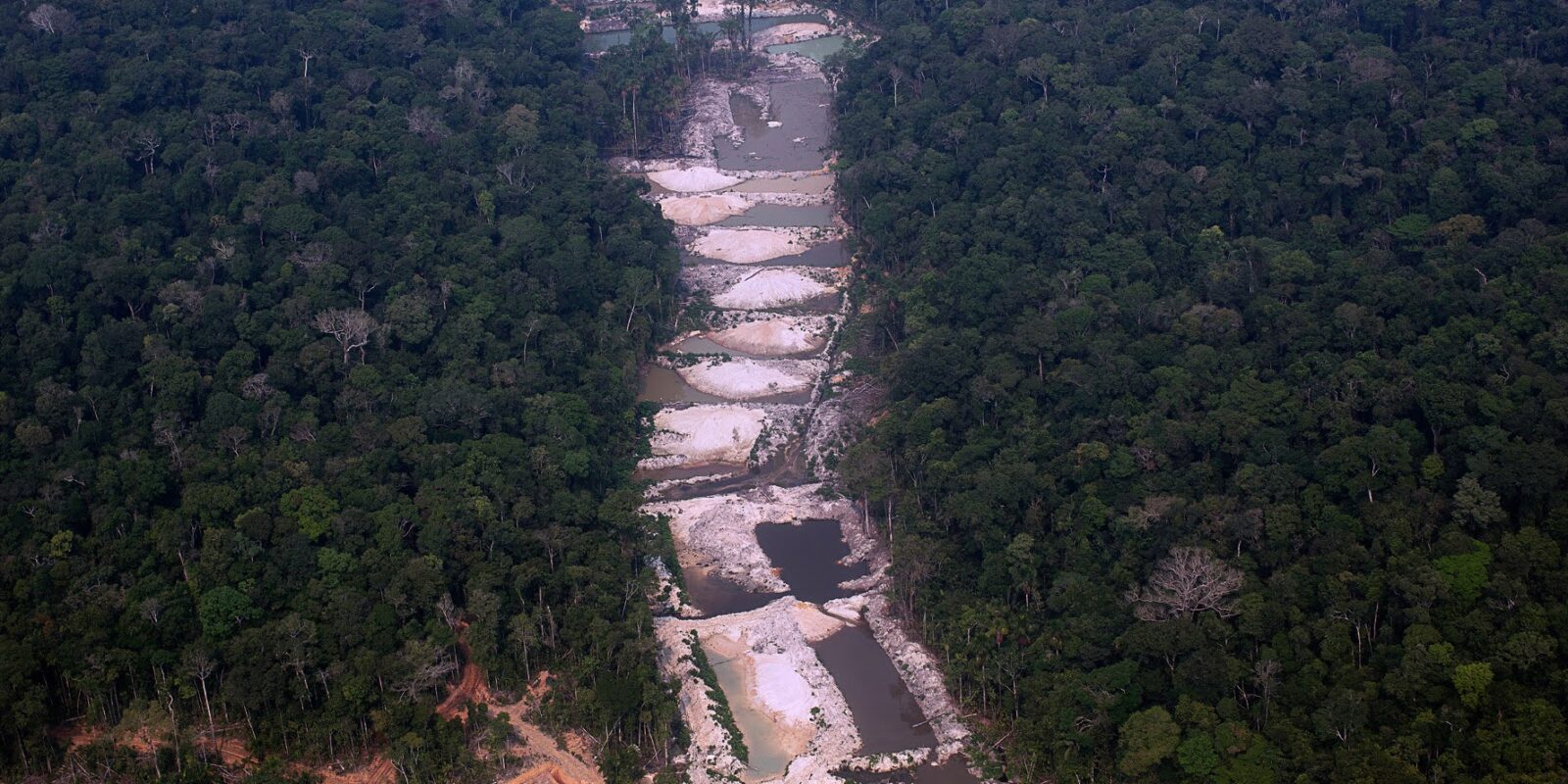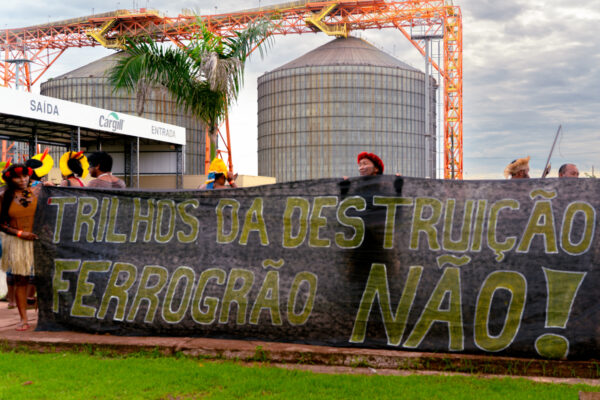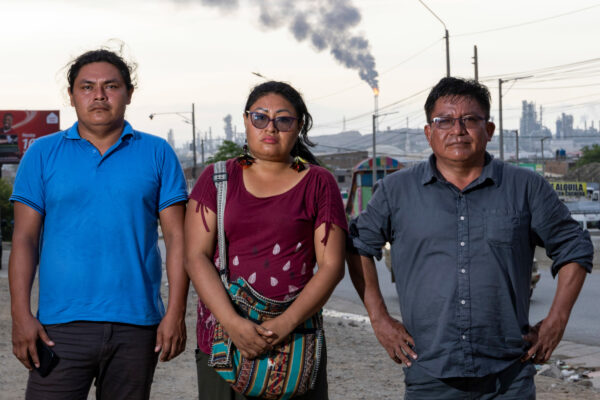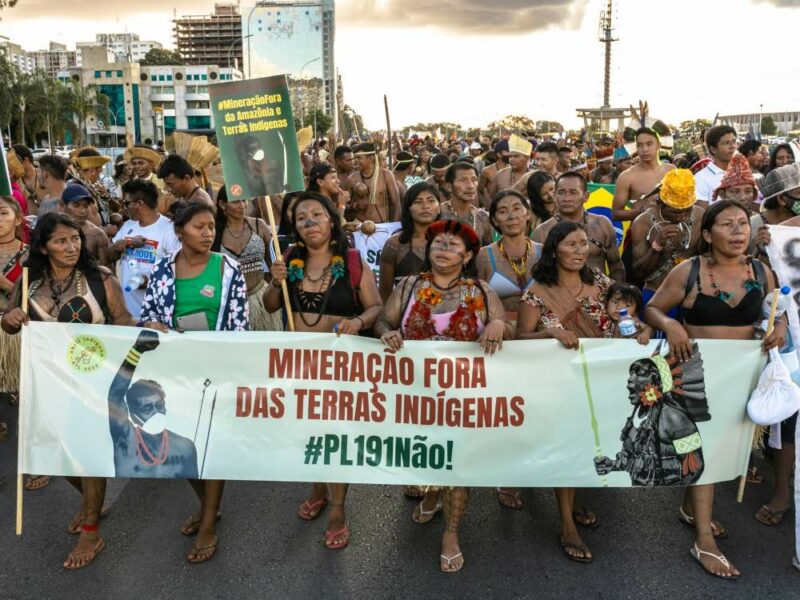“Who will defend us if not ourselves? Our territory is suffering the consequences of the invasion of loggers and miners, our people are in poor health, and our culture and way of life are in danger.”
Declaration from the Munduruku Resistance Assembly at Waro Apompu Village, Pará, Brazil – December 18, 2020
Amazon Watch has worked alongside the Munduruku since 2012, when their struggle to have their constitutional right to their ancestral lands respected led them to a process of self-demarcation of their lands in the Amazon state of Pará. They developed the Munduruku consultation protocol, to address any proposed economic enterprises in the region. We are proud to have stood with them in victories such as the suspension of the construction of the São Luiz do Tapajós mega-dam near their territory and continue to support them in their most difficult hours and struggles, such as with the distribution of essential medical supplies and equipment to fight COVID-19.
In our Complicity in Destruction III report published in October 2020 in partnership with the Association of Brazil’s Indigenous Peoples (APIB), we exposed the pressure that large mining companies are exerting on Indigenous lands, fueled by Bolsonaro’s efforts to open Indigenous territories to industrial mining. Among the case studies in the report, we highlight the various requests filed by Anglo American to prospect for minerals in concessions that overlap Munduruku land.
APIB and Amazon Watch issued a letter to mining giant Anglo American calling on it to make a public commitment not to conduct mining activities on Indigenous lands in Brazil, regardless of changes in Brazilian legislation. As a global mining leader with a significant footprint in Brazil, Anglo American’s commitment to not mine on Indigenous land would send a compelling signal to its peers. Such a move would deeply undermine Bolsonaro’s efforts to mobilize the capital and technical know-how of the global mining sector, which are essential to the development of the vast Amazonian concessions he envisions.
We call on Anglo to set the record straight regarding its research requirements overlapping Indigenous lands, offering concrete evidence of their withdrawal. And we also invite Anglo American to go a step further and publicly declare its commitment to refrain from mining activities in Indigenous lands in Brazil. This letter was developed to bring attention to the Declaration from the Munduruku Resistance Assembly at Waro Apompu Village from last December.
The Resistance Assembly of the Munduruku People met to discuss urgent threats to their territory and define resistance strategies in Pará, Brazil on December 18th. More than 200 participants from 47 Munduruku villages attended, and the assembly resulted in a forceful declaration demanding recognition of the Munduruku’s rights. Despite the ongoing pandemic, the Munduruku organized the meeting due to the increasing death threats against their lives and territories. Their declaration names Anglo American and BlackRock as sponsors of the destruction of their territory. And they are categorical in stating: “We want our territory free from mining and all activities that cause destruction, environmental, and social impacts – all of which are detrimental to the way of life of Indigenous peoples”.
Anglo American responded to our partners in the Business and Human Rights Resource Center regarding our report, that it had withdrawn all of its applications for mineral exploration in Indigenous lands. We consider this update an important breakthrough. This is no doubt a victory for the Indigenous movement and its allies, who have for years advocated for the constitutional right of Indigenous peoples to effectively reject mining in their territory, demarcated or not.
However, so far Anglo American has not provided any concrete evidence of these intentions, and a recent report from Brazilian news agency InfoAmazônia revealed that Brazil’s National Mining Agency (ANM) granted 27 permits for Anglo American to research copper prospecting in Indigenous lands in the states of Mato Grosso and Pará. Of these, 13 are in the Sawré Muybu Indigenous land in Pará state, which is part of the Munduruku territory. These applications were still valid in November 2020, after we received Anglo’s response, which raises the question of whether the company will honor its commitment.
Anglo American also stated in its response that it has no plans to carry out any activities related to mining on Indigenous lands in Brazil and that all of their mining activities follow the internationally recognized principle of Free, Prior, and Informed Consent (FPIC) of affected communities, regardless of local legislation. Despite being an important process to ensure the right to self-determination of Indigenous peoples, FPIC, if not completed properly can be markedly asymmetrical and unfavorable to Indigenous communities. Indigenous peoples are further supported by Brazil’s constitutional guarantees protecting Indigenous lands from industrial activities such as mining, which have a high potential for destructive impacts. A recent study published by One Earth revealed that allowing mining within Indigenous lands in the Brazilian Amazon could increase the devastating impacts this activity wreaks on the rainforest by more than 20 percent. It may also generate losses of up to $5 billion USD due to changes in the Amazon ecosystem, such as the regulation of rainfall patterns, food production, and global climatic stability.
This is particularly troublesome in the context of the Bolsonaro administration, which has declared plans to open Indigenous lands to industrial mining. An example of this is proposed law 191/2020, which could be put to a vote this year and represents a major setback for Indigenous and traditional peoples in the Amazon. The proposal, endorsed by Bolsonaro himself, would effectively invalidate any possibility of veto by Indigenous communities who oppose mining in their lands, contradicting the Constitution and Brazil’s international obligations, such as International Labor Organization (ILO) Convention 169.
Indigenous lands are protected by the Brazilian Constitution, and current attempts to change this regulatory framework represent a major threat to the rights of Indigenous peoples, to the integrity of their territories – which remain barriers against deforestation and the degradation of Brazilian biomes – and to the ecological and climatic balance resulting from the protection of Indigenous lands, particularly in the Amazon. The Munduruku have spoken: no mining in our lands!














